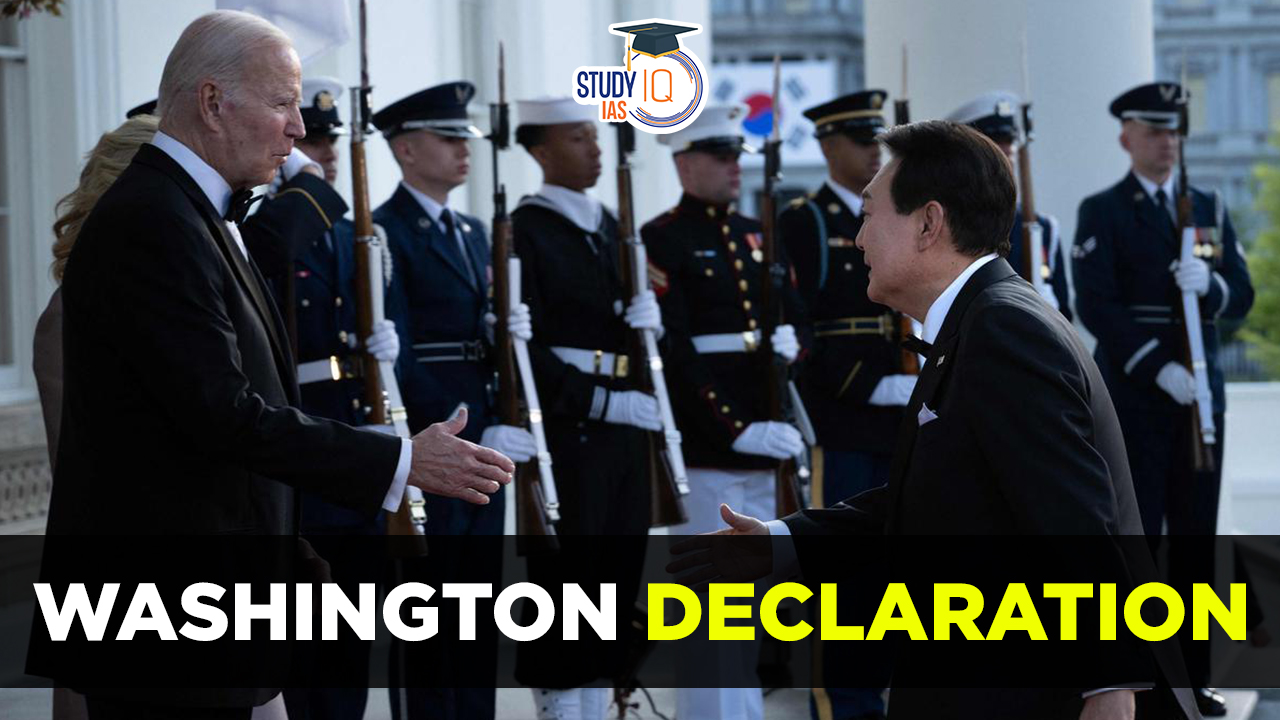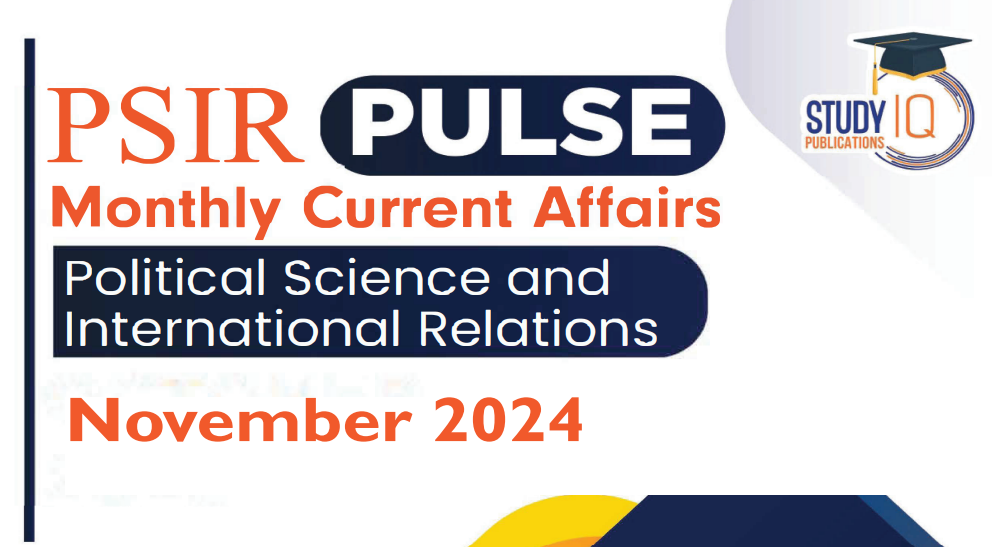Table of Contents
Context: The key highlight of the South Korean President’s recent visit to the United States to commemorate the 70th anniversary of U.S.-South Korea bilateral relations, was the signing of the “Washington Declaration.”
What is “Washington Declaration”?
- The Washington Declaration is an agreement signed between the United States and South Korea, which outlines a joint nuclear deterrence strategy. The declaration specifies several measures that the two countries will take in cooperation towards deterrence.
- According to the declaration,
- An American nuclear ballistic submarine would be deployed in the Korean peninsula;
- A nuclear consultative group would be formed to formulate principles of joint response tactics;
- South Korea would receive Intel from the U.S. regarding nuclear advancements; and
- The U.S. will strengthen South Korea’s nuclear deterrence capabilities through joint military training programs and an annual intergovernmental simulation.
- The declaration reaffirmed the non-proliferation Treaty implying that South Korea would not venture into the creation of its own independent nuclear capabilities and would instead focus on deterrence measures through an alliance-based approach.
- It also mandates the U.S. President as the only ‘sole authority’ to use the nuclear arsenal of the U.S. in the event of a nuclear confrontation.
US’ unwillingness in S Korea’s possession of Nuclear Arsenal
There are several reasons why the U.S. is not keen on South Korea having a nuclear arsenal:
- Firstly, the U.S. has been working towards the goal of non-proliferation, which means limiting the spread of nuclear weapons worldwide.
- Allowing South Korea to develop its own nuclear arsenal would go against this goal and could lead to an arms race in the region, increasing the risk of a nuclear confrontation.
- Secondly, the U.S. has been trying to persuade North Korea to give up its nuclear weapons program.
- Allowing South Korea to develop its own nuclear weapons could be seen as a provocative move by North Korea, potentially leading to an escalation of tensions in the region.
- Thirdly, the U.S. has been committed to maintaining stability in the region through its security guarantees to its allies, including South Korea.
- Allowing South Korea to develop its own nuclear weapons could undermine this stability and lead to further instability and unpredictability in the region.
- Finally, the U.S. has been striving to control global nuclear arms production, and allowing South Korea to develop its own nuclear weapons could complicate this effort. The U.S. has been encouraging its allies to rely on its own nuclear weapons for deterrence rather than pursuing their own nuclear programs.
Analysis of the Washington Declaration
- The Washington Declaration and the US-South Korea Alliance:
- The Washington Declaration (WD) has been criticized for not achieving anything substantial and only reiterating what was already inherent in the US-South Korea alliance.
- However, it does strengthen the US nuclear umbrella over South Korea through regular deployment of strategic assets, which has led to criticism from North Korea, Russia, and China.
- The US-South Korea alliance has also been made “ironclad,” and the US has explicitly stated that it will not locate any tactical nuclear weapons in South Korea and that South Korea should not pursue its own nuclear weapons program.
- The Importance of the Nuclear Consultative Group:
- Despite criticisms of the Declaration, it makes it possible for the US and South Korea to establish a Nuclear Consultative Group (NCG) similar to the one that exists between the US and NATO.
- Through this group, South Korea can have more control over nuclear response planning and coordination, although the nuclear weapons will be under the exclusive control of the US.
- The establishment of the NCG is a substantial outcome that demonstrates South Korea’s seriousness in its objective to become a “global pivotal power” through its proactive approach.
- South Korea’s New Security Posture and Global Strategy:
- The Washington Declaration also demonstrates South Korea’s new security posture and global strategy.
- It is an important step in the direction of creating more overt and close coordination among US allies in the Indo-Pacific to deal with disruptive powers such as North Korea, China, and Russia.
- The WD mentions the need to maintain the status quo in the Indo-Pacific and not allow any unlawful maritime claims, militarization of reclaimed features, or coercive activities.
- Potential Reactions from China, Russia, and North Korea:
- The WD and South Korea’s new security posture mean more counter-networking and reactionary acts on the part of China, Russia, and North Korea.
- However, it is unlikely to result in any breakthrough in the stagnant inter-Korea relations, as the current South Korean administration seems to have decided that their global strategy must not be hostage to North Korea.
- Geopolitical Dominance:Bottom of Form While the existence of the agreement is based on the security needs of South Korea, the policy reflects big power politics where the interests of the larger power (U.S.) takes precedence.
Regional Response to the Declaration
The regional response to the Washington Declaration has been mixed.
- China has criticized the agreement, arguing that it could lead to further confrontation in the region and undermine the global non-proliferation regime.
- North Korea has also warned that the declaration could increase the risk of conflict and undermine peace and security in Northeast Asia and the world.
- On the other hand, South Korea’s government has welcomed the agreement, seeing it as a necessary step towards enhancing their national security and deterring North Korea’s nuclear threats.
- However, the domestic response in South Korea has been more mixed, with some expressing concerns about the potential risks of being involved in a nuclear arms race and the consequences of relying too heavily on the U.S. for their national security.
Significance of the Declaration for India
While India is not a direct participant in this agreement, there are several ways in which the Washington Declaration could be significant for India:
- Strengthening the Quad: The Washington Declaration reinforces the US commitment to its allies and partners in the Indo-Pacific, including India. This could strengthen the Quadrilateral Security Dialogue (Quad) – a strategic forum consisting of the US, India, Japan, and Australia – which aims to promote a free and open Indo-Pacific region.
- Addressing Chinese Aggression: The Washington Declaration emphasizes the need to maintain the status quo in the Indo-Pacific and opposes any unlawful maritime claims, militarization of reclaimed features, and coercive activities. This is significant for India, which has had its own territorial disputes with China, including the ongoing border conflict.
- North Korea’s Nuclear Threat: The Declaration also highlights the nuclear threat posed by North Korea, which has been a concern for India as well.
- Building a Coalition: The Washington Declaration is part of a broader effort by the US to build a coalition of like-minded countries to address regional challenges. India’s strategic interests align with those of the US in many areas, including the need for a free and open Indo-Pacific, and India could play an important role in this coalition.


 AIBE 19 Question Paper 2024, Download XI...
AIBE 19 Question Paper 2024, Download XI...
 AIBE 19 Answer Key 2024, Download Unoffi...
AIBE 19 Answer Key 2024, Download Unoffi...
 UPPSC Answer Key 2024, Download Unoffici...
UPPSC Answer Key 2024, Download Unoffici...




















